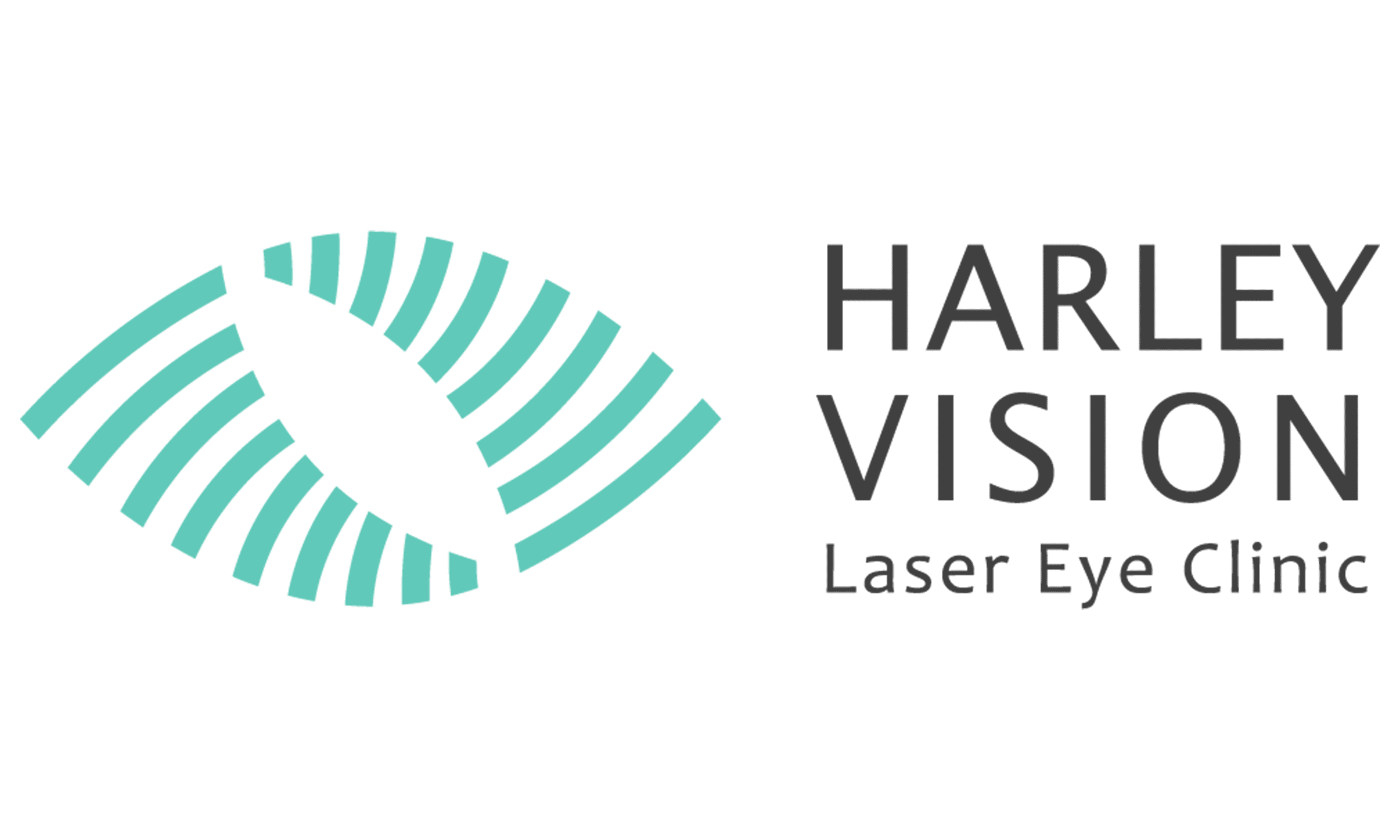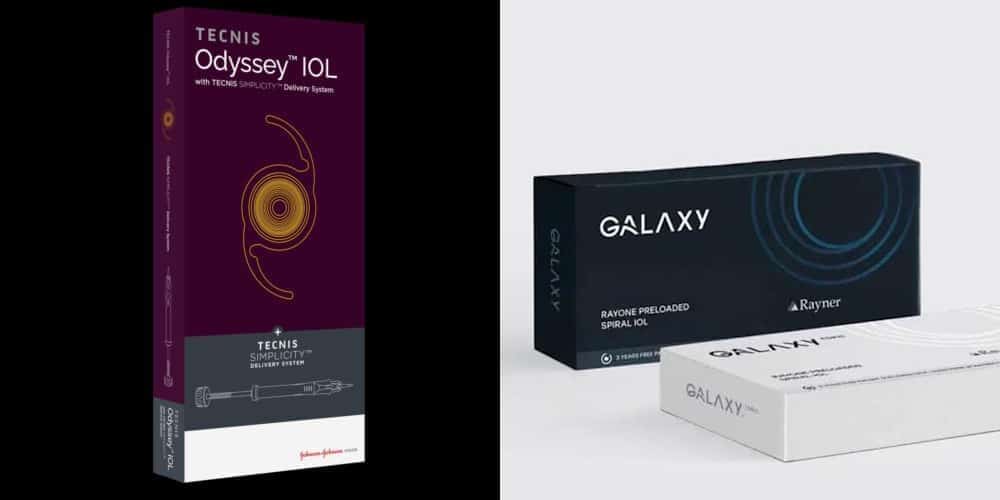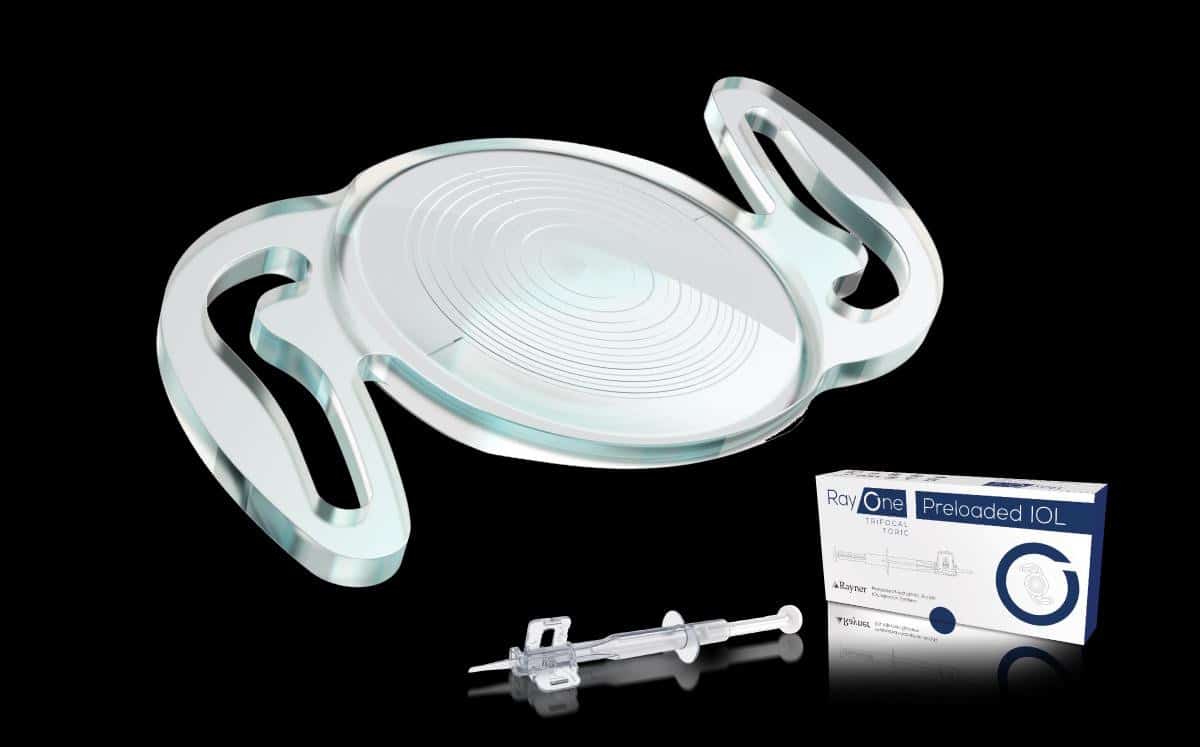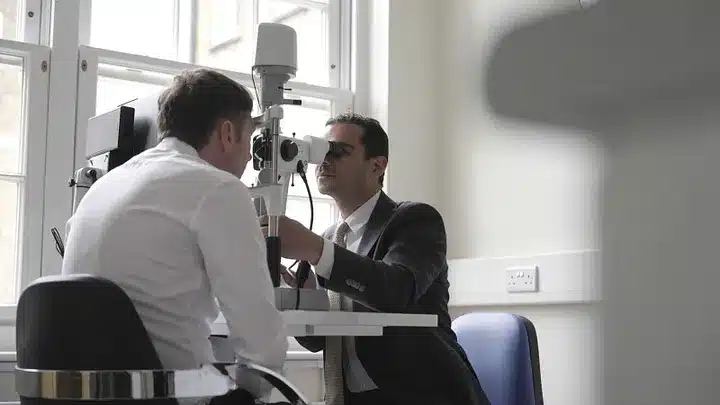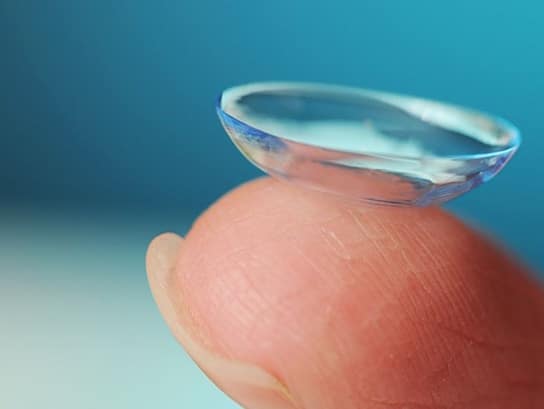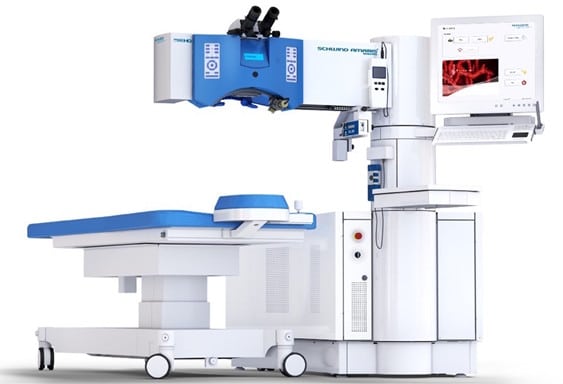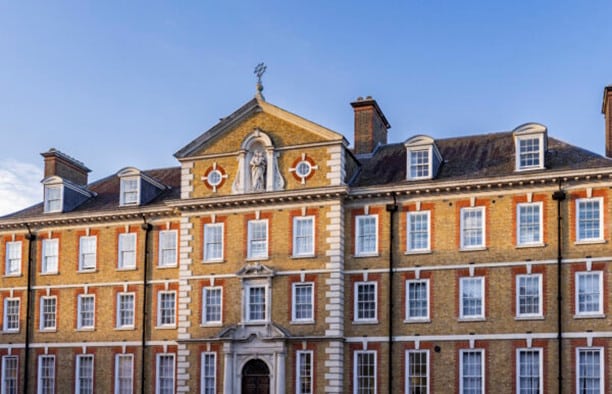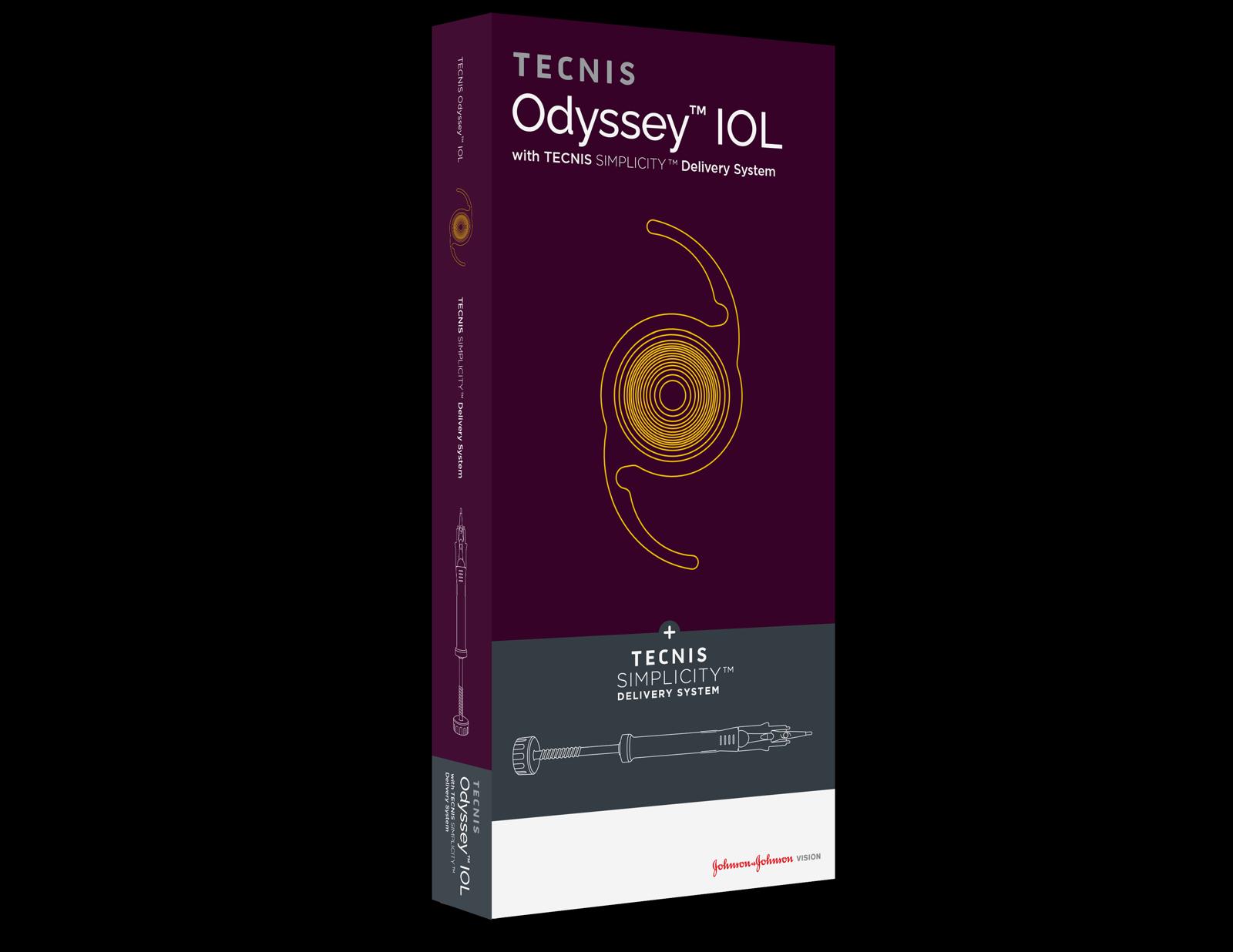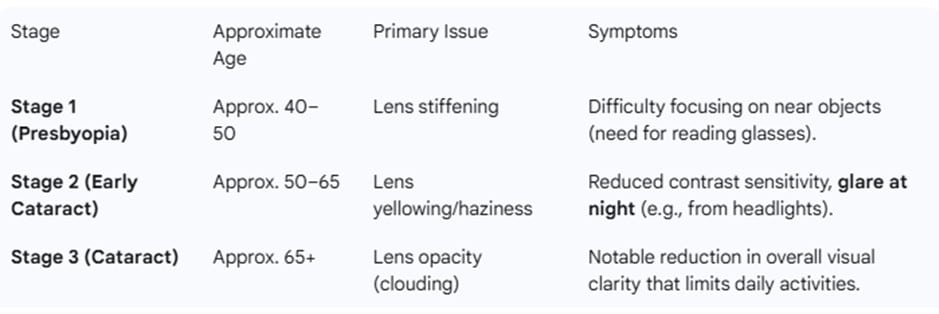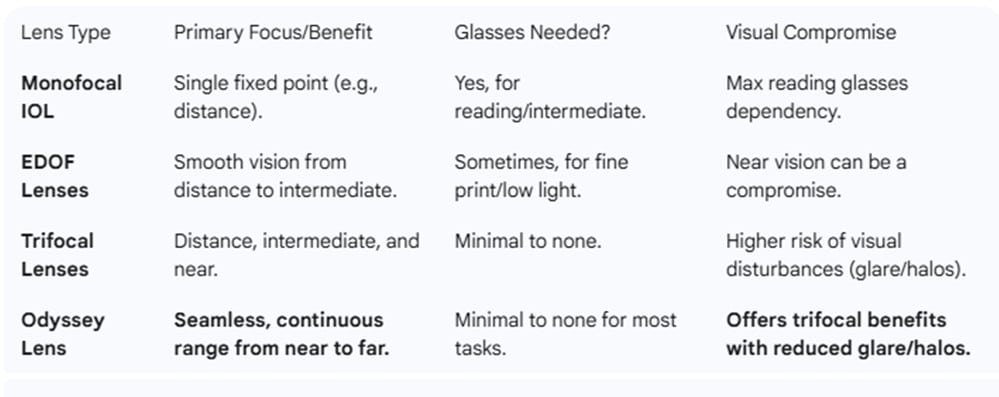Last edited November 2025 by:
👨⚕️ Mr Mohamed Elalfy MD, FRCOphth, FRCS, FEBO, FWCRS, CertLRS— World Expert in Refractive, Cataract & Corneal Surgery
👨⚕️ Mr Mukhtar Bizrah, MBBS, FRCOphth, FACS, FRCSC, FEBO, FWCRS, FHEA — Clinical Director, Harley Vision
Suitable for: Patients considering cataract surgery or refractive lens exchange who want maximum glasses independence with the fewest night-vision trade-offs.
Surgeon insights
“The Galaxy and Odyssey IOLs are fantastic lenses which are suitable for many but not all patients, and give excellent visual outcomes and patient satisfaction. They are not necessarily the best IOLs for all patients, and at Harley Vision we use a variety of increased range of vision and full range of focus IOLs to achieve patient expectations. We often use different IOL types for each eye in some cases to achieve the desired visual outcome. Despite fantastic technology, no IOL in the market will restore vision to be as good as it was for someone who has perfect vision without spectacles in their 20s and 30s. It is important for patients to understand this and have realistic expectations from cataract and lens replacement surgery. Having said that, patients often state at their follow up visit that their surgery has been life transforming, and many comment they wish they had this surgery years earlier.” — Mr Mukhtar Bizrah, MBBS, FRCOphth, FACS, FRCSC, FEBO, FWCRS, FHEA – Clinical Director, Harley Vision
“At Harley Vision, I am fascinated by the remarkable ability of modern IOLs to give patients excellent vision without spectacles and freedom to pursue their work and hobbies. The critical step is patient selection and counselling—not just the lens choice.” — Mr Mohamed Elalfy MD, FRCOphth, FRCS, FEBO, FWCRS, CertLRS – World Expert in Refractive, Cataract & Corneal Surgery
More surgeon insights below throughout this article.
Quick Answers
| Your priority | Best initial fit | Why |
| Night-driving clarity / fewer halos | RayOne Galaxy | Non-diffractive spiral optic aims to preserve contrast and reduce halo size vs classic diffractive designs. |
| Strongest near (reading) + broad toric range | TECNIS Odyssey & | FDA-approved Full Visual Range (FVR) design with robust near performance and labelled toric models. |
| Mature early-market adoption & regulatory momentum | Odyssey | Widely adopted since 2024–25 with strong platform heritage and evidence-base |
| Newest optical concept | Galaxy | AI-designed non-diffractive spiral targeting a smooth defocus curve with minimal light splitting. |
Bottom line: Both deliver a full range of vision. Galaxy generally leans toward smoother night vision; Odyssey also minimises night vision symptoms such as glare. Your best choice depends on your lifestyle needs, cornea health, pupil characteristics, ocular surface, and tolerance for night-time phenomena.
Table of Contents
- What these lenses are
- How the optics differ (no jargon)
- Visual performance you’ll actually notice
- Night vision & dysphotopsia
- Astigmatism & toric choices
- Who tends to suit which lens
- Safety, trade-offs & expectations
- Your Harley Vision care pathway
- Pricing at Harley Vision (tiers)
- FAQs
- References & evidence notes
- What these lenses are
Both RayOne Galaxy (Rayner) and TECNIS Odyssey (Johnson & Johnson Vision) are presbyopia-correcting intraocular lenses used in cataract surgery or refractive lens exchange (RLE). They are designed to give distance + intermediate + near vision, reducing dependence on glasses.
- How the optics differ
RayOne Galaxy — non-diffractive spiral
A smooth “spiral” surface redistributes focus without splitting light into hard rings.
Aim: continuous range of focus with high light transmission, supporting contrast and potentially smaller halos around focal points of light (e.g. car headlights)
TECNIS Odyssey — freeform diffractive (FVR)
A freeform diffractive profile engineered for a continuous defocus curve.
Aim: strong near with low-light performance and an optimised dysphotopsia profile vs older diffractive designs.
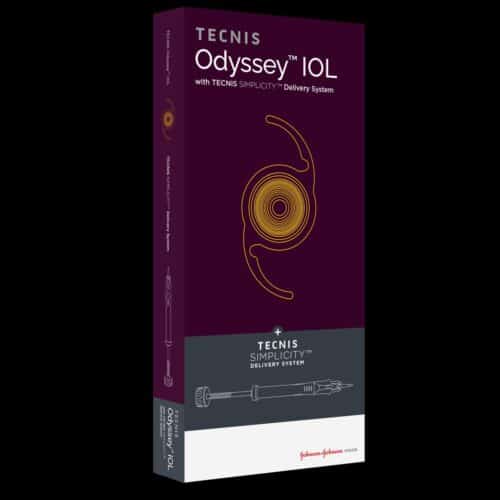
- Visual performance you’ll actually notice
Distance: Both Galaxy and Odyssey are excellent when measurements and surgery are precise. It is important to understand that these IOLs are designed to give excellent not ‘perfect’ distance vision.
Intermediate (computer) and Near (reading): Both Galaxy and Odyssey give a good smooth range of intermediate and near vision.
Low light: Both are designed for confidence at dusk/night; Galaxy’s non-diffractive approach emphasises contrast preservation; Odyssey focuses on optimised contrast via freeform diffractive control.
- Night vision & dysphotopsia
You may still see rings or glow around lights early on—this is normal and usually settles.
Galaxy: Early evaluations suggest halo size closer to enhanced monofocals for many patients.
Odyssey: Real-world reports show a high proportion of none/mild halos, glare, or starbursts.
Mr Bizrah’s thoughts: ‘Both Galaxy and Odyssey IOLs are designed to enable minimum night vision problems such as glare and haloes. However, night vision symptoms are not completely eliminated, and some patients still find them bothersome. It is important to remember that night vision symptoms can arise to various factors besides the IOL, such as dry eyes or pupil size. Careful patient selection and counselling, and optimising the ocular surface make the biggest difference’.
- Astigmatism & toric choices
Both RayOne Galaxy and TECNIS Odyssey IOLs come in toric models to correct corneal astigmatism.
We use state-of-the-art biometry, wavefront aberrometry and modern AI-based calculators where indicated to optimise visual outcomes
Mr Elalfy’s thoughts: ‘At Harley Vision, we believe that toric IOLs are the gold standard for astigmatism correction, offering more reliable, accurate and long-term correction of astigmatism. Techniques such femto-laser assisted cornea incisions are less predictable, more prone to regression (astigmatism returning) and significant complications (e.g. infection). We have a low threshold for using toric IOLs as both research evidence and our experience indicate they optimise your change of achieving independence from spectacles.’
- Who tends to suit which lens
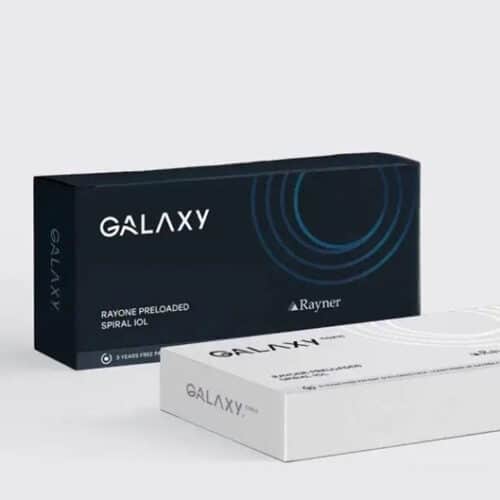
Choose Galaxy if you:
- Drive frequently at night or have a history of being halo-sensitive. It is particular suitable for those having surgery on a single eye, as previous multifocal lenses resulted in some tolerance issues when implanted in one eye only.
- Want a non-diffractive concept that prioritises contrast and smooth intermediate to near vision range.
- Are comfortable with a newer technology whose independent, long-term data is still growing.
Choose Odyssey if you:
- Prefer a widely adopted platform with FDA approval and strong early-market evidence.
- Would like an IOL that given a good range of distance to near vision (no IOL gives 100% guarantee of spectacles independence)
- Are comfortable with a diffractive design aiming to optimise (not abolish) dysphotopsia.
At Harley Vision, we are not tied to any company. We choose the best laser or implants for your eyes without any exclusivity deals forcing us to use lasers and implants from one company. This independence means we can offer you what we believe is the best choice for your eyes, whether that’s Galaxy, Odyssey, or another premium lens option. Learn more about why Harley Vision.
- Safety, trade-offs & expectations
Both lenses are safe when matched correctly to the patient and implanted by experienced surgeons specialising in vision correction surgery.
Trade-offs exist: stronger near vs the smoothest night profile; your eyes and lifestyle decide.
Post-LASIK or dry-eye?
Key factors to consider: Optimise the ocular surface and use post-LASIK formulae to calculate the optimal IOL power; residual prescription tolerance differs by design, so planning matters.
Neuroadaptation: This related to your brain adapting to the new IOL implanted. Neuroadaptation to IOLs varies from one person to the next, and vision often settles over days, weeks or months. At Harley Vision track your progress and support you every step of the way.
Hear from Our Patients: Real Harley Vision Reviews
Our patients consistently share their positive experiences at Harley Vision. Here are a few examples from Trustpilot:
Watch the video of Dr Bizrah discussing cataract surgery with his eye surgeon colleague Dr Hove who underwent cataract surgery at Harley Vision:
“I recently had bilateral phacoemulsification and Trifocal lens implants done by Mr Bizrah. From start to finish the process was seamless. I was well looked after and I felt confident in Mr Bizrah’s ability to deliver a good result – and he delivered. As an Ophthalmologist myself, I know the pressure I was putting on a colleague asking him to do my eyes, and worse still use a lens he wasn’t familiar with. Nothing fazed him. Now 4 weeks later – I can see 6/5 N5 both eyes. I’ve been operating without any issues. I knew there would be glare and halos but they are worth it for the clarity of vision and spectacle independence.”
– Dr Hove, UK
“I am a consultant surgeon and I needed an important eye operation (cataract). The team at harley vision are exceptional in terms of organisation, communication, efficiency professionalism and overall care. Dr Bizrah is a fantastic doctor and world class ophthalmologist. Outstanding care and result!”
– Dr Alex, UK
“Found all of staff to be very friendly and accommodating like the fact that they knew who I was, called me by my Name when I arrived. As for the treatment got exactly what was said on the tin. Every thing I was told about the treatment and what would happen would unfold as describe, so no surprises. Day of the operation staff where very good, professional and friendly made me feel very relaxed. Already recommending them to others.”
“It’s like magic! I can see…… no more glasses! The journey was seamless. Dr Bizrah not in anyway pushy & explained everything I needed to know. The surgery itself was no problem & not once was I uncomfortable or scared or in any discomfort. Can’t express how happy I am to have unaided sight again!!”
– Sarah, UK
“This is the ultimate experience in ocular precision. Wonderful treatment. Wonderful result. How technology has progressed. Dr Bizrah deserves to receive all the credit he gets.”
Why Harley Vision for new IOLs like Odyssey & Galaxy
- Extensive surgical expertise: Mr Mohamed Elalfy is a highly skilled double-qualified consultant ophthalmologist and associate professor who specialises in complex cornea, cataract and vision correction surgery.
With more than 20 years of experience in ophthalmology, Mr. Elalfy has successfully performed thousands of laser refractive surgeries (e.g. LASIK), cataract and lens replacement surgeries with premium lenses.
- Expert Clinical Directors: Mr. Mukhtar Bizrah is a UK and Canada trained refractive, cataract and corneal surgeon, known for delivering outstanding outcomes with premium lenses. He is one of the few ophthalmic surgeons in the world certified in the UK, USA, Canada, Europe.
- Early Access to Innovation: As one of the earliest UK clinics to offer the Galaxy and Odyssey IOLs, we have deep experience with their benefits, limitations and suitability criteria.
- Advanced Diagnostics: Comprehensive assessment: biometry (multi-device), corneal tomography/topography, tear-film analysis, pupil dynamics, aberrometry. We use AI-powered lens planning tools to select the ideal IOL for each patient.
- Hospital-Based Surgery: Procedures are performed at top-rated CQC-registered London hospitals (including the Hospital of St John and St Elizabeth, and King Edward VII’s Hospital).
- Patient-Centred Care: From initial consultation to post-op care, we ensure your treatment is tailored, comfortable, and transparent.
- Shared decision: we weigh the benefits, trade-offs, and toric needs to choose the right IOL, whether it is Galaxy, Odyssey or any well-designed IOL approved for use in UK. We closely match the IOL choice to your lifestyle needs.
In other words:
✅ Harley Vision is 100% independent
✅ We choose lenses based on your needs, not based on exclusive supplier deals
✅ Access to every major platform globally
✅ Including Rayner, J&J Vision, Alcon & more
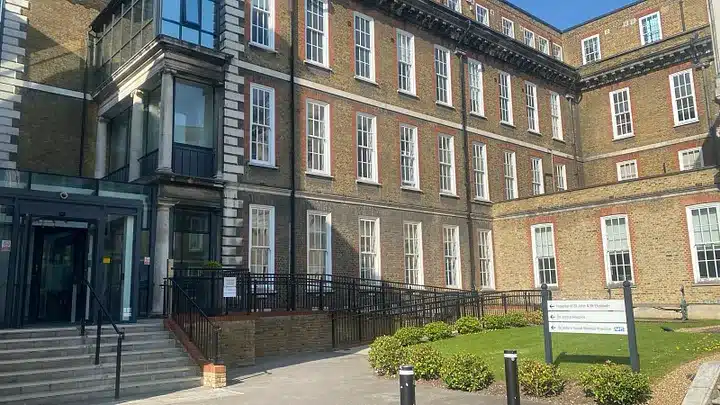
At Harley Vision, cataract and lens replacement surgery are performed at top UK hospitals like St John’s and Elizabeth hospital. All hospitals are CQC-regulated and state of the art. We do not cut costs by performing your surgery in a cheap surgical room with suboptimal ventilation, hygiene or staffing!
FAQs
Will I see halos at night?
Possibly at first. In the long-term, most patients report minimal to no visually significant haloes with Galaxy and Odyssey IOLs. Matching the IOL type to your eyes and lifestyle needs is key.
Which lens is best for reading fine print?
As of 2025, there are no robust head to head studies comparing TECNIS Odyssey to RayOne Galaxy effectiveness for intermediate and near vision. Our team at Harley Vision has extensive experience in using modern IOLs and can guide to which IOL will better suit you based on personal experience and evidence-based data.
I have astigmatism – can I still be glasses-free?
Often yes. Both Galaxy and Odyssey come in toric versions; success depends on precise measurements and alignment. Learn more about astigmatism correction.
Are Galaxy and Odyssey lenses available in the UK?
Yes—both are available at Harley Vision in the UK. The UK has one of the widest ranges of IOLs available worldwide compared to many other countries.
Odyssey also has US FDA approval; Galaxy is CE-marked and in active use across Europe. As of Nov 2025, Galaxy is it not yet FDA approved in US.
I have had LASIK before, am I suitable?
Usually, with careful planning and counselling. We use post-LASIK formulae, topography-guided biometry, and set realistic expectations. Our expertise in vision correction surgery and specific experience in performing cataract surgery in patients following laser vision correction enables us achieve optimal outcomes.
What if I have cataracts?
Both lenses are ideal choices for cataract surgery. During the procedure to remove your cataract, we replace your cloudy natural lens with either Galaxy or Odyssey to restore clear vision at far, intermediate and near distances.
Can I have these lenses if I don’t have cataracts? Absolutely. Refractive lens exchange (RLE) uses the same premium lenses to correct vision in patients who may not yet have cataracts but want to reduce their dependence on glasses or contact lenses. RLE is also known as lens replacement surgery and typically performed for patients age of 50 years and above.
Can IOL lenses be replaced or removed if I’m not happy?
Yes, IOLs can be exchanged, though this is rare (less than 1% of cases). Most adaptation issues resolve within 3-6 months as the brain adjusts to the new optics. At Harley Vision, our comprehensive pre-operative assessment and lens-matching process minimizes the risk of dissatisfaction. We also provide thorough aftercare to optimize your visual outcome.
How long do IOL implants last?
IOL implants are designed to last a lifetime. Unlike natural lenses, artificial IOLs do not develop cataracts or degrade. Once implanted, they provide permanent vision correction without the need for replacement under normal circumstances.
11. References & evidence notes
Important note to patients reading this:
Design intent are summarised from manufacturer disclosures and early clinical/bench evaluations.
This is an independent analysis. Neither Rayner nor Johnson & Johnson Vision have sponsored or reviewed this content.
Claims are conservative: Where companies present strong figures (e.g., “0% light loss”, “smaller readable print vs comparator”), we treat these as manufacturer-reported and interpret alongside independent data as it emerges.
The Galaxy is relatively new and while early results are promising, long-term outcomes are less abundant in independent literature.
What matters most: match lens choice to your ocular metrics, tear film, pupil, and lifestyle. We continuously review new peer-reviewed data to advise the best possible intraocular lens for our patients.
At Harley Vision, our independence from manufacturer ties means we select lenses based purely on what’s best for your individual eyes. The UK offers one of the world’s best selections of laser and lens implant technology, and we leverage this advantage for our patients’ benefit. Learn why Harley Vision’s independence matters.
Explore your suitability for the Galaxy or Odyssey IOLs with Harley Vision
See which lens fits your eyes best.
Book a consultant-led assessment with lifestyle needs and a night-vision discussion tailored to your eyes.
Contact Information:
📍 Location: Central London locations including Harley Street
📞 UK: 0207 030 3181
🌍 International: +44 207 030 3181
📧 Email: [email protected]
References & Evidence Notes
- Rayner Surgical Group. RayOne Galaxy™ Product Information and Clinical Insights.
- Johnson & Johnson Vision. TECNIS Odyssey™ Full Visual Range IOL: FDA Summary of Safety and Effectiveness.
- Cochener B, et al. Clinical performance of the TECNIS Symfony and TECNIS Odyssey IOL families. J Refract Surg. 2025;41(2):121-129.
- Bissen-Miyajima H, Midorikawa M, Fujisaki R, Ota Y, Minami K, Honda R. Early Clinical Results of a Newly Developed Continuous Range of Vision Intraocular Lens. Ophthalmol Ther. 2025 Nov;14(11):2937-2945. doi: 10.1007/s40123-025-01235-7. Epub 2025 Aug 31. PMID: 40886256; PMCID: PMC12534203.
Internal links:
